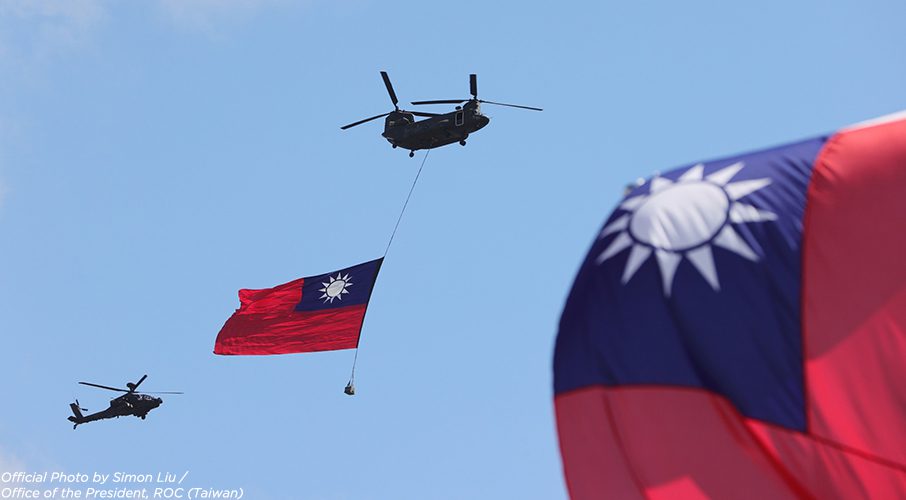
Ottawa must stop tip-toeing around Taiwan and bring much greater clarity – indeed, moral clarity – to its policy vis-à-vis this natural ally, writes J. Michael Cole in the Globe and Mail.
By J. Michael Cole, October 22, 2021
The 150-kilometre Taiwan Strait has become one of the world’s most dangerous flashpoints of late. There has been a more visible, and more international, naval presence in the region in response to the approximately 150 Chinese military aircraft that had performed provocative incursions into the air defence identification zone of Taiwan, the democratic island-nation that authoritarian Beijing claims as part of its indivisible territory.
So when the frigate HMCS Winnipeg transited the strait last week, accompanied by the American missile destroyer USS Dewey, it was noteworthy. It wasn’t the first such journey by a Canadian navy vessel, but it was the first since the release of Michael Spavor and Michael Kovrig a month ago. To many observers, the efforts to secure the release of the two detained Canadian nationals, and efforts to secure their release, had impeded Ottawa’s willingness to challenge Beijing’s “red lines” on anything from its rampant human rights abuses in Tibet and Xinjiang to its engagement with Taipei. The Canadian frigate’s arrival, then, marked the possibility of a much-needed shift in policy.
Like other democracies, Canada finds itself at an inflection point on China. More than ever, it must weigh the benefits of giving in to the siren song of the Chinese market against the real risks of being complicit in efforts by Beijing to rewrite international law, redefine human rights, and narrow the space within which liberal democracy – principles that are anathema to the Chinese Communist Party – can flourish.
For far too long, Ottawa has been reluctant to push back against China’s authoritarian revisionism. And arguably, nothing has underscored this lack of moral clarity more than Canada’s laggardly policy on Taiwan, a nation that shares our values. At this junction, and as the world reassesses the value of Taiwan to the international community, Ottawa must clearly decide which camp it is in – and if it decides it is in the liberal democratic camp, then it must definitely rethink its entire Taiwan strategy.
First and foremost, Ottawa must put an end to the deplorable practice of allowing Beijing to define the substance of Canada’s Taiwan policy. Canada’s “one China” policy in no way recognizes, as China claims, that Taiwan is part of China – let alone the People’s Republic of China, which has not governed Taiwan for a second since the PRC’s emergence in 1949. Ottawa merely “takes note” of Beijing’s claim of sovereignty over Taiwan. It is Ottawa, not Beijing, that decides what is permissible and what is in its own interest in its relationship with Taiwan.
Furthermore, those decisions are not set in stone but must rather reflect shifting conditions within the international system. When Canada chose to derecognize the Republic of China (Taiwan’s official name) in 1970 and established diplomatic relations with the PRC, Taiwan was under martial law, occupied by a regime that had fled to the island after its defeat to the communists in the Chinese civil war. Since then, Taiwan has transformed into a vibrant, law-abiding democracy and an economic powerhouse.
Today’s Taiwan also exists under constant threat of annexation – and at risk is the stability of the entire Indo-Pacific region. The continuous military presence of like-minded countries in the region therefore provides an essential deterrent against a Chinese attack on Taiwan. If we are to do our part in this endeavour, we must make sure we have the capabilities to do so.
As such, Ottawa must stop tip-toeing around Taiwan and bring much greater clarity – indeed, moral clarity – to its policy vis-à-vis this natural ally. Many countries, including ones much weaker than Canada, such as the Czech Republic and Lithuania, have done so and survived Beijing’s threats of retaliation. We need to take charge of our institutions, business and universities, and not abandon them whenever they face Beijing’s intimidation and blackmail. We also need to stop pretending that low-level engagement with Taiwan on “safe” issues – which Canada has been doing for years – is sufficient. If we are to shape the world in a way that is hospitable to the values that define us, then we must do much more.
J. Michael Cole is a Taipei-based senior fellow with the Macdonald-Laurier Institute.





